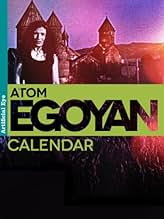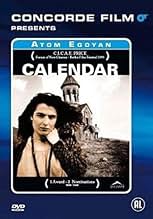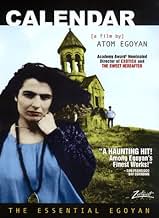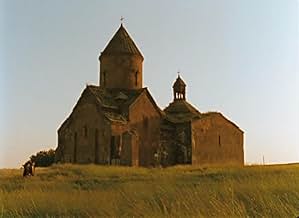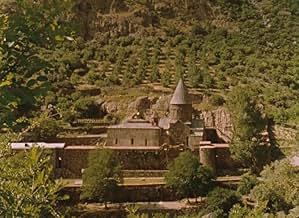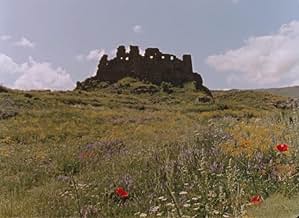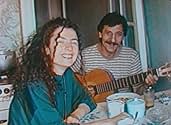Calendar
- 1993
- Tous publics
- 1h 14min
NOTE IMDb
6,7/10
2,5 k
MA NOTE
Ajouter une intrigue dans votre langueA woman stays in Armenia after her photographer husband completes his assignment and returns home to Canada.A woman stays in Armenia after her photographer husband completes his assignment and returns home to Canada.A woman stays in Armenia after her photographer husband completes his assignment and returns home to Canada.
- Récompenses
- 1 victoire et 2 nominations au total
Avis à la une
Not Atom Egoyan's most 'story-driven' film, but his best from a purely aesthetic/cinematic perspective. His use of non-linear chronology, repeated scenes that slowly give way to understanding, and long drawn out takes that let you really start to feel the moment (how many viewers start to notice the slight differences in the various sheep, or look for their birthdays on the pages of the wall-calendar?) puts this film close to the level of Tarkovsky, Angelopolous, Bresson, etc.
While "Exotica" and "The Sweet Hereafter" are, understandably, his better known films (and good ones at that), "Calendar" works even better as the full realisation of theme and emotion using all the elements of cinema working in conjunction.
While "Exotica" and "The Sweet Hereafter" are, understandably, his better known films (and good ones at that), "Calendar" works even better as the full realisation of theme and emotion using all the elements of cinema working in conjunction.
A photographer and his wife take photographs of Armenian churches for use in a calendar. Their driver, a local resident, expounds on the history of the churches while the wife translates. The photographer becomes jealous of his wife's bonding with the driver.
This film seems to have near-universal acclaim, with one exception: a reviewer at a certain Washington newspaper who found the film to be too intelligent for the average viewer. Really? The plot is not that hard to follow, and you know what else? Not all movies need to be mindless entertainment.
I applaud Egoyan for making smart, and still good-looking, film. I have now seen most of what he has made, and I can't say he has really let me down yet. Some are better than others, but there are no duds. And this is far from a dud.
This film seems to have near-universal acclaim, with one exception: a reviewer at a certain Washington newspaper who found the film to be too intelligent for the average viewer. Really? The plot is not that hard to follow, and you know what else? Not all movies need to be mindless entertainment.
I applaud Egoyan for making smart, and still good-looking, film. I have now seen most of what he has made, and I can't say he has really let me down yet. Some are better than others, but there are no duds. And this is far from a dud.
Atom Egoyan's been very consistent in his career about two things. He likes messing with time frames, and his movies can come across as distant bordering on pretentious. Over the years he's been perfecting the former, and making improvements on the latter, as evidenced in Exotica, and, especially, in the beautiful, devastating The Sweet Hereafter.
Calendar came before those films, and it is even more experimental than they are. It would feel pretentious if it wasn't for the fact that Egoyan (more or less playing himself) portrays himself in a very unflattering light. But the whole enterprise does have that familiar Egoyan chill. He plays a photographer who is taking pictures of old Armenian churches for a calendar.
In what is perhaps an expression of self-doubt regarding his aesthetic instincts, his character seeks only to capture the superficial beauty of the churches, paying little attention to the history behind them. He is on this trip with his wife (played by Egoyan's wife), and both of them are of Armenian origin. In Calendar, Egoyan could be trying to comment on any number of things, about his relationship to his wife, to his roots, and to his art. At times it seems like you can almost discern a message coming through, and the film does become somewhat intriguing, but in the end the director is simply too subtle for his own good. And thus he keeps his audience at arm's length.
The shots of churches, though, are beautiful enough to make one want to visit Armenia.
Calendar came before those films, and it is even more experimental than they are. It would feel pretentious if it wasn't for the fact that Egoyan (more or less playing himself) portrays himself in a very unflattering light. But the whole enterprise does have that familiar Egoyan chill. He plays a photographer who is taking pictures of old Armenian churches for a calendar.
In what is perhaps an expression of self-doubt regarding his aesthetic instincts, his character seeks only to capture the superficial beauty of the churches, paying little attention to the history behind them. He is on this trip with his wife (played by Egoyan's wife), and both of them are of Armenian origin. In Calendar, Egoyan could be trying to comment on any number of things, about his relationship to his wife, to his roots, and to his art. At times it seems like you can almost discern a message coming through, and the film does become somewhat intriguing, but in the end the director is simply too subtle for his own good. And thus he keeps his audience at arm's length.
The shots of churches, though, are beautiful enough to make one want to visit Armenia.
Questions of diasporic national identity are brilliantly addressed in the concept of a modern society, through various media, paralleled to more personal and private issues such as jealousy, stubbornness and personal pride. Only a person with very little life experience could not comprehend anything to what is going on in this movie. Atom Egoyan succeeded in making a very universal film that is touching at more than only one level. With this film, he proves that he is more than a good film director, but truly an artist who is able to transpose a world view through simple a medium, with low budget. This is personally my favorite Egoyan film, though it's by no means the longest or most commercially successful.
10Stu-24
Atom Egoyan's work is almost always about a distance from the immmediate events occurring. This film is no exception to this rule, but is heartbreakingly more accute in its treatment of the theme. Unlike the more popular films, there is no sympathy for the supposed main character, played by Atom himself. He is a dispicable, soul-less chap, without hope or redemption, lost in a fate of repetition that is of his own creation. Moreso than Egoyan's other films, this repetition is a fantasy, moreso than compulsion. Here guilt is as much at play as destiny.
This film hurts me.
This film hurts me.
Le saviez-vous
- AnecdotesThe film was mostly improvised, and made for barely $80,000.
- ConnexionsEdited into 365 days, also known as a Year (2019)
- Bandes originalesBlue Feeling
Written and Arranged by John Grimaldi
Performed by Studebaker John and the Hawks
Meilleurs choix
Connectez-vous pour évaluer et suivre la liste de favoris afin de recevoir des recommandations personnalisées
- How long is Calendar?Alimenté par Alexa
Détails
Box-office
- Budget
- 80 000 $CA (estimé)
- Durée1 heure 14 minutes
- Couleur
- Rapport de forme
- 1.85 : 1
Contribuer à cette page
Suggérer une modification ou ajouter du contenu manquant


